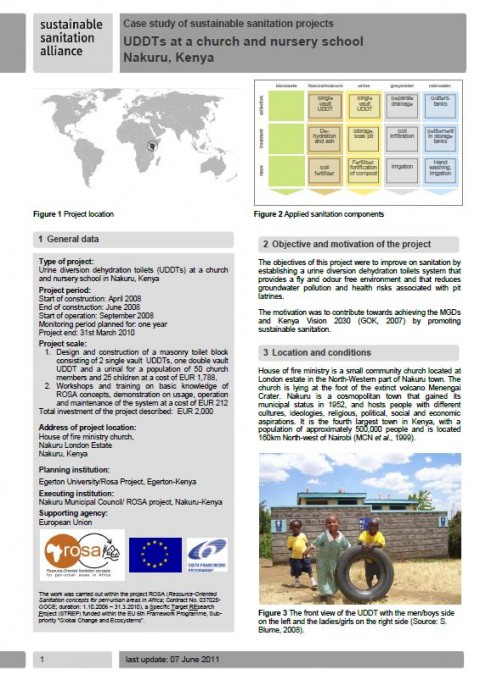UDDTs at a church and nursery school Nakuru, Kenya - Case study of SuSanA
Muchiri, E., Mutua, B. (2010)

Published in: 2010
Publisher:
Sustainable Sanitation Alliance (SuSanA)
Author:
Muchiri, E., Mutua, B.
Uploaded by:
SuSanA secretariat
Partner profile:
common upload
10811 Views
156 Downloads
Location of library entry
Content - Summary
This SuSanA case study compiles experiences from a ROSA sanitation pilot project in a church and nursery school in Nakuru, Kenya. Single and double vault UDDTs and urinals were constructed to serve a population of 50 adults and 25 children. Urine and faecal matter are used onsite in a small piece of farm. The facilities were monitored and evaluated after about 3 years of operation showing that one toilet cubicle was closed due to few users and challenges with cleanliness. A follow up saniation program called CLARA will address the raised issues in this peri-urban area of Nakuru.
The objectives of this project were to improve on sanitation by establishing a urine diversion dehydration toilets system that provides a fly and odour free environment and that reduces groundwater pollution and health risks associated with pit latrines.
The motivation was to contribute towards achieving the MGDs and Kenya Vision 2030 (GOK, 2007) by promoting sustainable sanitation.
The UDDT project is managed by the House of Fire church bishop and management after being handed over. However, the ROSA project has continued to intervene as and when need arises especially on technical matters. The day to day cleaning of the toilet is done by the 3 nursery school teachers and a family living in the compound also using the facility.
To ensure proper use and basic operation and maintenance of the UDDT, occasional training and demonstration is conducted by the ROSA team to the users. It is planned that the collection, transportation and treatment
of the faeces from this church will later be done by a service provider every three to six months, depending on the filling rate and the number of people using the toilet. The urine tank may be emptied as soon as there is market or when locally required.
Results from monitoring done for one year have showed that the project has had a positive impact. The church receives many visitors that are interested in adopting the UDDT. There is a great potential for up-scaling the pilot project in Nakuru and other areas in Kenya in the future. Already many people have shown interest and about sixteen households in London estate have started to construct similar UDDTs.
For long term sustainability and for economic sanitation, the following is recommended:
Encourage the church management to have a sense of ownership and to ensure good operation, maintenance and management.
Encourage users to spread the knowledge of the ROSA system to the communities they live in, so as to create a critical mass.
To demonstrate the additional economic benefits arising from the utilisation of the products. To test the health effect of handling faeces and urine during collection, transportation, treatment and reuse meant to serve as a source of researched information that can be used in the decision making on utilisation of products.
Bibliographic information
Muchiri, E., Mutua, B. (2010). UDDTs at a church and nursery school Nakuru, Kenya - Case study of SuSanA. Sustainable Sanitation Alliance (SuSanA)
Filter tags
Case studies in SuSanA template English Peri-urban Schools Sub-Saharan Africa Urine Urine diversion dehydration toilets (UDDTs)















